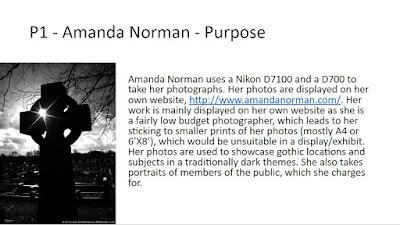Image analysis
In order to do this, you will find professional photographers, and you will analyse their photography
Image analysis is straightforward, and it's the kind of thing you've been doing since unit one. Here are some things to think about:
Is the image typical of the photographers work?
- For this you’ll need to be familiar with their portfolio, and the ideas their trying to communicate in their work
Framing, positioning + composition (shot distance)
- What is the subject(s) (or ‘focal point’) of the photo?
- Where is the subject(s) positioned in the frame?
- If there is more than 1 subject in the photo, how do the subjects relate to the each other (positionally)?
- Do we see the entire subject, or just a portion? Why might this be?
Lighting
- Does the photo feature natural or artificial lighting (or both)? → What effect does this have on what the photo is trying to communicate?
- Is there an ‘expressive’ use of lighting? (e.g. strong/noticeable use of bright light? Heavy use of shadows?)
Content
- What do other visual elements signify? (e.g. props, costumes, hair, make-up, location, colours)
- Do any of the visual elements complement or clash with each other?
Focus
- Is everything is sharp focus, or is anything in ‘soft focus’ (blurred)? → Why might certain objects be blurred?
Angles
- Has a high or low angle been used? → Why might this be?
Mode-of-address
- Does the subject (model) make eye contact with the audience? → What does this signify?
- If there are multiple models, are they looking at each other? → What does this signify?
- Mode of address is how the image 'speaks' to the audience. So how does this image make you feel? Is it comforting or threatening? How is this achieved?
 |
| An example of excellent analysis |
No comments:
Post a Comment